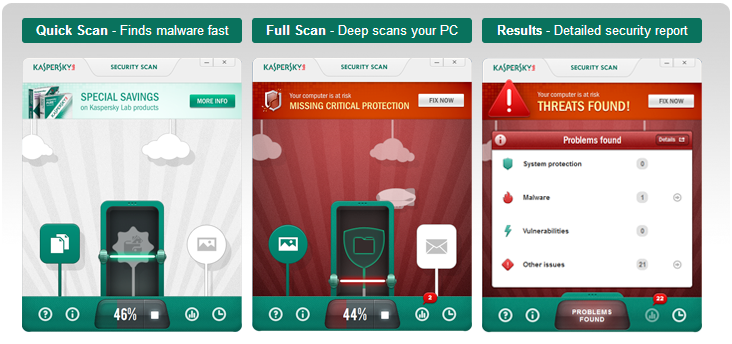5% of computers protected by antivirus are still infected
Every twentieth computer that has anti-virus protection is still infected with one or another virus. We arrived at this conclusion by analyzing the statistics of the free Kaspersky Security Scan (KSS) service launched about a year ago.
This is a very large number - according to the most modest estimates, it is about 50 million cars - so we conducted additional research.

For those who missed the appearance of this tool, we recall that KSS is a free computer scanner for viruses, vulnerabilities and other security problems. It does not conflict with other antiviruses, so it can be used to assess the state of the computer in case of doubt.
250 thousand recent KSS launches were analyzed, all the cases when the virus was inactive (located in the archive, in the cache, corrupted, in quarantine, in the basket, not fully loaded) were filtered from the results. The result is generally the same - among the tested Windows computers (mainly home PCs), an active infection is present on 5% of the computers protected by the antivirus.
In unprotected cars, the indicator is almost three times higher - 13%.
Of course, we can say that KSS is loaded only by those who suspect something is wrong.
But practice shows that those who are not concerned about their health, get sick at least. Therefore, the overall picture is unlikely to differ significantly.
')
Considering that in the world now, according to various estimates, it runs from 1.5 to 2 billion PCs, throwing away the corporate park and users of other OS, we can tentatively say that the typical “home computer or small office based on Windows” scenario covers about a billion machines . 5% of them - 50 million victims of various kinds of malware. These are many, many botnets, DDoS, spam, stolen credit cards and intimate photos.
Interesting regional specificity. KSS is actively used in the Americas, Europe, the Middle East and Southeast Asia.
Least of all infections (less than 3%) in Germany, Austria and Switzerland, a little more in Scandinavia and the Czech Republic.
Most infections (more than 10%) in Russia, Ukraine, Belarus, Kazakhstan, Turkey, Thailand, the Philippines, Vietnam, India and Egypt.
What is the reason for such a division - a great computer literacy and caution of users, or more comfortable conditions of "work" for cybercriminals - a reason for a separate study.
This is a very large number - according to the most modest estimates, it is about 50 million cars - so we conducted additional research.

For those who missed the appearance of this tool, we recall that KSS is a free computer scanner for viruses, vulnerabilities and other security problems. It does not conflict with other antiviruses, so it can be used to assess the state of the computer in case of doubt.
250 thousand recent KSS launches were analyzed, all the cases when the virus was inactive (located in the archive, in the cache, corrupted, in quarantine, in the basket, not fully loaded) were filtered from the results. The result is generally the same - among the tested Windows computers (mainly home PCs), an active infection is present on 5% of the computers protected by the antivirus.
In unprotected cars, the indicator is almost three times higher - 13%.
Of course, we can say that KSS is loaded only by those who suspect something is wrong.
But practice shows that those who are not concerned about their health, get sick at least. Therefore, the overall picture is unlikely to differ significantly.
')
Considering that in the world now, according to various estimates, it runs from 1.5 to 2 billion PCs, throwing away the corporate park and users of other OS, we can tentatively say that the typical “home computer or small office based on Windows” scenario covers about a billion machines . 5% of them - 50 million victims of various kinds of malware. These are many, many botnets, DDoS, spam, stolen credit cards and intimate photos.
Interesting regional specificity. KSS is actively used in the Americas, Europe, the Middle East and Southeast Asia.
Least of all infections (less than 3%) in Germany, Austria and Switzerland, a little more in Scandinavia and the Czech Republic.
Most infections (more than 10%) in Russia, Ukraine, Belarus, Kazakhstan, Turkey, Thailand, the Philippines, Vietnam, India and Egypt.
What is the reason for such a division - a great computer literacy and caution of users, or more comfortable conditions of "work" for cybercriminals - a reason for a separate study.
Source: https://habr.com/ru/post/174183/
All Articles